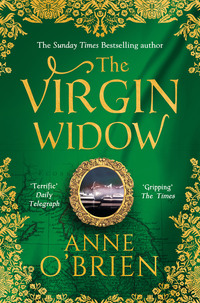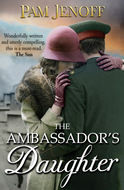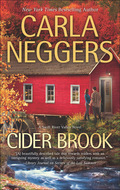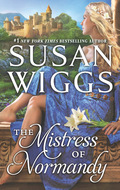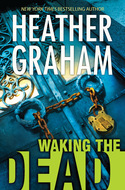Kitap dosya olarak indirilemez ancak uygulamamız üzerinden veya online olarak web sitemizden okunabilir.
Kitabı oku: «Virgin Widow», sayfa 2
Her less-than-subtle criticism of despicable Clarence spurred me on. Without argument, I allowed Isabel to weep out her loss on my shoulder and told her that surely everything could be made right once we had found a landing. I hated my empty words, but Isabel seemed to find some solace there.
Sometimes it seemed to me that we would never find a safe haven.
The Earl made his decision. On the first day of May, when the sun actually broke through the clouds and shone down on our wretched vessel, we reached our goal and anchored off the port of Honfleur in the mouth of the great river that flowed before us into the depths of France. Standing at the Earl’s side, I watched as the land drew closer, as the sun glinted on the angled wings of the wheeling gulls. For the first time in days my spirits rose from the depths.
‘The Seine,’ my father explained, but I already knew.
‘Do we land here? Do we stay in Honfleur?’ I was fairly sure of the answer. There was really only one destination possible for our party.
‘No. We go on to Paris.’
‘Why?’
‘Why, indeed, my percipient daughter. It’s a question I ask myself in the dark hours.’ The Earl laughed softly, but it held an edge that grated on my nerves. ‘It has been an unpalatable decision to make.’
So much I knew. Although I might anticipate the wealth and the luxury of the French Court—I had never been there, only heard of its sumptuous magnificence under the open-handed rule of King Louis XI—my father was not taking us there for the comforts of the feather beds and the culinary delight of roast peacock served on gold plate. We had all of that and more in our own home in London, Warwick Inn, where foreign ambassadors were sent to us to be impressed.
‘What choice do we have but to go to the French Court unless we wish to roam the seas for ever?’ he asked of no one, certainly not expecting an answer from me. ‘We are going to throw in our lot with Louis.’
‘Will he help us?’
‘I don’t know.’
A brutally honest answer. But why wouldn’t he? I knew my father had worked tirelessly for an alliance between King Edward and Louis. That Louis had always had a strong regard for the Earl, addressing him as my dear cousin Warwick despite the lack of shared blood.
‘Can you not persuade him?’
It caused the Earl to glance down at me, his preoccupation tinged with amusement. He smiled. ‘Yes, perhaps I can. I think he will help us, simply because it is in his French Majesty’s nature to find some personal gain for himself in doing so. I can accept that. Don’t we all snatch at our own desires out of the miseries of others? But…there’ll be some hard bargaining. I wager I’ll not like the result.’ He took a deep breath as he must, before he could tolerate his decision. I thought he might choke on the necessity of it. ‘Beggars can’t choose where to put their allegiance.’ I could sense his sour disgust in the salt wind that caused both of us to shiver. Suddenly age seemed to press heavily on him. His dark hair, almost black, and so like my own, might gleam in the sun, but flecks of grey told their own tale.
‘Will we be made welcome?’ I still wanted to know.
My father turned back to search my face with a quizzical stare. It was a strange look, full of careful calculation. ‘Yes, I think we will,’ he murmured, eyes widening as if a thought had struck home.’ You will be made welcome, my daughter, at all events.’
‘I? What does King Louis know of me?’
‘Nothing yet, other than that you are my daughter. But he will not turn you from his door.’
I did not know why, nor did I ask further, coward that I was on this occasion, subdued by the events of those moody past days. I was a younger daughter who had once been betrothed to Richard of Gloucester. And had rapidly become undesirable as a bride and so was promptly unbetrothed when my father had taken up arms against Richard’s brother, King Edward. Now I was a hopeless exile. I could not imagine why the French King would give me even a second look. But the skin on my arms prickled with an unpleasant anticipation.
Now, without words, I followed the direction of the Earl’s appraisal of the French coast, where the grey waters of the vast river-mouth opened up before us. The rain-spattered land was as bleak and almost as unfriendly as the shores we had just left. I tried to see it—and us, our present situation—through my father’s eyes, and failed. The Earl of Warwick, powerless and well-nigh destitute, his lands confiscated, his good name trampled in the bloodstained mud of treachery.
How had it all come to this?
Chapter Two
1462—Middleham Castle, North Yorkshire
DESPITE my lack of years, I knew that I was an important person. I had always known that I was important. I was told as much by my sister Isabel when I was six years old. Or at least she had informed me from her heady and condescending height of eleven years that I might be important, but not as important as she was. Which was a typical calumny by my sister. Stated with overwhelming conviction, but with imperfect knowledge and little truth.
Isabel was five years older than I. Five years is a long time at that age. So with all that wealth of experience and her acknowledged position as the elder child of the powerful Earl of Warwick, she lorded it over me. She was tall for her age with fine light hair that curled at the ends, fair skin and light blue eyes. She looked like our mother, and our mother’s father, Richard Beauchamp, so I was led to believe, whereas I favoured the Neville side, to my detriment as I considered the comparison between us. Slight and slimboned with dark hair—unfortunately straight—dark eyes and sallow skin that did me no favours in cold winter weather. It was generally accepted that I would not have my sister’s beauty when I was grown, nor would I grow very tall. I was small for my age and wary of Isabel’s sharp fingers that pinched and poked.
We had had an argument over the ownership of a linen poppet dressed in a fine Court gown fashioned from scraps of old damask. It had been stitched for us by Bessie, our nurse, with embroidered eyes, black as the fire grate, and a pout of berry-red lips. The hair had been fashioned of wool and was black and straight beneath her linen veil. Because of her resemblance, I claimed stridently that the poppet was mine, but the squabble ended as it usually did with Isabel snatching it from my hands and holding it out of reach.
‘You’re cruel, Isabel. It was given to me. It was made for me.’
‘It’s mine. I’m older than you.’
‘But that does not mean that you are cleverer. Or that the poppet is yours.’
‘It means I am more important.’
I glared, fearing that she might be right. ‘I don’t see why it should.’
Isabel tossed her head. ‘I am my father’s heir.’
‘But so am I.’ I did not yet understand the workings of the laws of inheritance. ‘My father is the Earl of Warwick, too.’
She sneered from her height. Isabel had a very fine sneer. ‘But I’m the elder. My hand will be sought in marriage as soon as I am of marriageable age. I can look as high as I please for a husband. Even as high as a Prince of the Blood.’
Which was true enough. She had been listening to our servants gossiping. The phrase had the smack of Margery at her most opinionated.
‘It’s not fair.’ A last resort. I pouted much like the disputed poppet.
‘Of course it is. No one will want you. You are the youngest and will have no inheritance.’
I hit her with the racquet for the shuttlecock. It was an answer to every difficulty between us. She retaliated with a sharp slap to my cheek. Our squawks echoing off the walls of the inner courtyard brought our mother on the scene as well as our governess, Lady Masham, and Bessie. The Countess waved the women aside with a sigh of long-suffering tolerance when she saw the tears and my reddened cheek and swept us away to her parlour. There she pushed us to sit on low stools before her. I remember being suitably subdued.
The Countess knew her daughters well. She preserved a stern face against the humour of our petty wilfulness as she sat in judgement.
‘What is it this time? Isabel? Did you strike your sister? Did you provoke her?’
Isabel looked aside, a sly gesture as I thought. ‘No, madam. I did not.’
I knew it! She thought I would be similarly reticent. We had been lectured often enough on the sin of pride and she would not wish to confess to the Countess the nature of our dispute. But the hurt to my self-esteem was as strong as the physical sting of the flat of Isabel’s hand and so I informed on her smartly enough. ‘She says that she’s more important. That no one will want me for a wife.’ The hot tears that sprang were not of hurt, but of rage.
‘Nor will they!’Isabel hissed like the snake she was. ‘If you can’t keep a still tongue—’
‘Isabel! Enough! It does not become you.’ The Countess’s frown silenced my sister as she leaned forwards to pull me, and the stool, closer. ‘Both of you are important to me.’ She blotted at the tears with the dagged edge of her over-sleeve.
I shook my head. That was not what I wanted to hear. ‘She says that she will get all our father’s land. That I will get nothing.’
‘Isabel is wrong. You are joint heiresses. You will both inherit equally.’
‘Even though I am not a boy?’ I knew enough to understand the pre-eminence of such beings in a household. There were none in ours apart from the young sons of noble families, the henchmen, who came to finish their education with us. And they did not count. My mother had not carried a son, but only two girls.
‘Well…’The Countess looked doubtfully from one to the other, then back to me. ‘Your father’s lands and the title—the Neville inheritance—are entailed in the male line. That means that they will pass on to the son of your Uncle John and his wife Isabella. But the lands I brought to this marriage with your father belonged to my father and my mother, Richard Beauchamp and Isobel Despenser. It is a vast inheritance—land and castles and religious houses the length and breadth of England. And it will be split equally between the two of you.’
‘But she is too young.’ Isabel sprang to her feet so that she could stare down at me with all the hostility of being thwarted. ‘It should all be mine.’
‘You are greedy, Isabel. Sit down.’ Our mother waited until she did with bad grace. ‘Anne will not always be so young. She will grow into a great lady as you will. The land will be split equally. So there—you are both equally important.’
‘But I look like you.’ Isabel smiled winningly.
The Countess laughed, although I did not understand why. ‘So you do. And I think you will be very beautiful, Isabel. But Anne has the look of her father.’ She touched the veil on my braided hair, still neat since it was early in the day. ‘She will become more comely as she grows. Looks mean nothing.’
I expect my answering smile was disgracefully smug. When we were dismissed, Isabel stalked off, chin raised in disdain, but I stayed and leaned close, struck by the appallingly adult consequence of this conversation.
‘Mother—will you have to be dead before we have the land?’
‘Yes.’
‘Then I don’t want it.’
She smiled, then hugged me. ‘It is a long way in the future, God willing, for both of us.’
So the course of my life was to be underpinned by the Countess’s inheritance, half of which would pass to me. More importantly, my existence was to be turned on its head by Richard Plantagenet. Richard came into my life when I was eight years old and I was not overly impressed. We were living at Middleham, far in the north of the country at the time, the Earl and Countess’s favourite residence of all our castles. There were always young boys of good birth living in our household, from the most pre-eminent of families since the Earl was the King’s chief counsellor. They came to learn what they would need to know for a life in the highest circles. I had little to do with them, being a girl about her lessons, whilst the arts of warfare exercised most of their time. I was still in the company of Bessie and Lady Masham, an impoverished widow from the Countess’s wide-flung family employed to instruct me in the skills as chatelaine of a great household. The boys with their rough games and combative sports, an endless succession of clouts to the head, scrapes and bruises, did not interest me. Nor did they have any time for me. Except for Francis Lovell, my father’s ward, who was a permanent presence in the household and was not averse to spending time to talk to me although he was more my sister’s age. Francis was kind, above and beyond the demands of chivalry, towards a nuisance of a child such as I was.
Then Richard arrived.
I first noticed him, I think, because he reminded me of myself—we both suffered similar deficiencies. Shorter rather than taller. Slightly built rather than robust. A lot of dark hair as black as the wing of one of the ravens that nested in the crags beyond Middleham, although a lot more untidy than their sleek feathers. With the cruelty of youth I decided that because of his unimpressive stature and build he would make heavy weather of the training. What he would make of me I did not care. He was just another boy come to eat at our table and improve his manners.
My father was away, sent by the King on an embassy to the French Court, so the Countess welcomed the newcomer in the main courtyard when he arrived with his escort, his body servant and train of baggage wagons. An imposing entourage for so young a person.
‘Welcome to Middleham, your Grace,’ the Countess received him.
He bowed with surprising deftness. Even I could see that he had been well taught in the demands of courtly behaviour. Some of the lads almost fell over in the effort, flushing the colour of a beetroot at so gracious a reception by so great lady as my mother, before being taken in hand.
‘My lady.’ His reply was low, but not unconfident. ‘My lady mother the Duchess sends her kind regards and thanks you for your hospitality.’
My mother smiled. ‘You are right welcome. The Master of Henchmen will show you where you will sleep and where to put your belongings. You will answer to him for all your training.’ She indicated Master Ellerby at her side. ‘Then my daughter Isabel will show you to my parlour where I will receive you.’
She pushed Isabel forwards. The unloading began, horses led off to the stabling, the escort to their quarters, our guest’s possessions carried within. It all took time. Isabel had no intention of waiting until it was all complete.
‘I’ll come back for you,’ she informed the boy, shockingly ill mannered, and took herself off about her own concerns. But for once I lingered. Why should I do so? I had no idea but impulse made me stay. The boy did not look particularly pleased to be with us but then the newcomers rarely did. His face was pale and set but composed enough. I studied him as he lifted a bundle containing two swords, a light bow and a dagger from one of the wagons. His lips were thin, with corners tightly tucked in as if he would not say more than he had to. He had a tendency to frown. Perhaps it was his eyes that caught my imagination. They were very dark and cold. No spark of warmth lurked in their depths. Dispassionately, I decided that he looked sad.
So I followed him up the stairs into the living apartments with all the assurance of a daughter of the house. Was I not Lady Anne Neville? I got under everyone’s feet in the doorway until at last Richard Plantagenet’s belongings were stowed away in chests and presses and he sat on the edge of the bed in the room allotted to him for his stay at Middleham.
I took a step into the room. I looked at him. He looked at me.
‘This is a very fine room,’ I informed him, out to impress the newcomer, but also curious. It was one of the circular tower rooms at one of the four corners of the great central keep where we, the family, lived. The stone walls curved in a pleasing fashion whilst the windows, long and narrow in the old style, looked out over the outer courtyard towards the chapel and so allowing more light and air than in many of the rooms. It had its own garderobe in a small turret, a desirable convenience in winter weather when it was necessary for most of the household to brave the chill of the garderobe tower. The Earl’s henchmen were rarely housed so well. Even Francis Lovell, who was almost as important as I and would be a lord, was installed in a bleak little room in the northerly tower that caught a permanent blast of cold air. ‘I think this is one of the best rooms in the castle.’
‘Is it? To my mind it’s cold and draughty.’
I followed his quick survey of the room. Well, it didn’t have the thick tapestries of the room that I shared with Isabel. Nor were the walls plastered and painted with fanciful flowers and birds as in the Countess’s own bedchamber. The floor was of polished oak boards rather than the fashionable painted tiles that had been laid in Warwick Castle. I frowned as I picked up what this boy might think was lacking. But the wooden bedstead was canopied and hung with silk drapes that must surely please, with a matching silk bedcover. The deep green shimmered as a dart of sunshine lanced across it. There was a chest and a press for garments. There was even a whole handful of wax candles in a tall iron candle-stand that could not be sneered at by anyone who wished to read…What more did he want?
‘And where have you come from?’ I hoped my brows rose in a semblance of the Countess at her most superior. How dared he sit in judgement on my home when his own was probably little more than a crude keep and bailey, with no improvements since its construction under William the Norman!
‘Fotheringhay. My father had a new wing built with wall fireplaces and lower ceilings.’ He cast another uncharitable eye around his accommodation.
‘This castle,’ I stated, voice rising, ‘is one of the largest in the country.’
‘That does not make it the most comfortable. Or where I would wish to be.’ He looked at me as if I were an annoying wasp. ‘Who are you, anyway?’ he asked.
‘I am Lady Anne Neville,’ with all the presumption of indulged youth. ‘Who are you?’
‘Richard Plantagenet.’
‘Oh.’ I was no wiser, although the name Plantagenet was a royal one. ‘My father is the Earl of Warwick.’
‘I know. The Earl is my cousin, so we are cousins once removed, I suppose.’ He did not seem delighted at the prospect.
‘Who is your father?’ I asked.
‘The Duke of York. He is dead.’
I ignored the shortness of the reply, homing in on the information. Now I knew. ‘So your brother is King Edward.’ That put the newcomer into quite a different category in my mind.
‘Yes.’
‘How old are you?’ I continued my nosy catechism. ‘You don’t look old enough to begin your training as a knight. I am more than eight.’
‘I am twelve years old. I am already a Knight of the Garter.’
‘Only because your brother is King!’
He shrugged as he bent to pat a hound that had wandered in, clearly not prepared to offer any more conversation.
‘I too am very important,’ I informed him. I had no dignity.
‘You are a girl. And still a child.’
Which put me entirely in my place. I turned on my heel and stomped from the room, leaving him to make his own way or wait for Isabel’s tender mercies. I think it was Francis Lovell who eventually took pity on him and took him to my mother’s chamber. I was not there. Lady Masham had run me to ground in her fussy manner and scolded me for absenting myself from my lessons.
I was not satisfied with my brief acquaintance.
Richard Plantagenet continued to say little, but took to his studies well enough. He intrigued me. His confidence. His quiet, self-contained competence. I began to haunt the exercise yard and the lists when I could where he practised the knightly drills. And I was right. He suffered. He did not have the stature or strength of muscle to hold his own against Francis, who was often pitted against him. Richard spent a lot of time sprawled in the dust and dirt. But he did not give in. And I had to admire his courage, his determination to scrape himself up from the floor. Quick and alert, he soon learned that he could make up in guile and speed for what he lacked in size and weight. He could ride a horse as if born in the saddle.
But still he was often on the floor with a bloody nose and dust plastered over his face. After a particularly robust session with sword and shield, Master Ellerby sent him to sit on the bench as the side of the exercise yard. Still dazed, Richard Plantagenet rubbed his face and nose on his sleeve. I crept along by the wall and sat on the bench with him. An opportunity too good to miss, to find out more whilst his guard was down. What did I want to know? Anything, really. Anything to explain this solemn youth who sat quietly at meals, who carved the roast beef with stern concentration, who watched and absorbed and said little.
‘Are you content here?’ I asked for want of anything more interesting to say.
He snorted, pushing his hair from his eyes. ‘Better when my head is not ringing from the Master’s gentle blows! I swear Edward did not intend me to be knocked senseless when he sent me here.’
‘You said you did not want to be here.’ The implied criticism of Middleham still rankled. ‘Where would you rather be, that’s better than here?’
‘With my brother. In London. That’s where I shall go when I am finished here.’
‘Do you miss your family?’
He thought for a moment. ‘Not much.’
‘Do you have brothers other than the King? Sisters?’
‘Yes. Ten.’
‘Ten?’ Shock made me turn to face him. ‘I only have Isabel. That’s enough.’
‘But some are dead, and all are older than I. George of Clarence is the one I know best.’
‘You are the Duke of Gloucester.’ I had acquired some knowledge since our exchange of views. ‘Your father was attainted traitor when he fought against the Lancastrian upstart Henry, the last king.’
‘Yes.’ Richard bared his teeth. ‘And he died for it on the battlefield at Wakefield. And my brother Edmund with him. Margaret of Anjou, Queen Margaret, had my father’s head cut from his body and put on a spike above Micklegate Bar in York. A despicable end for a brave man.’
It was the longest speech I had heard him make. He still felt the hurt of it.
‘Did you have to hide?’
‘In a way. We—my brother Clarence and my mother—had to go into exile for our safety. We went to the Netherlands.’ His guard was clearly down, offering so much.
‘Did you like it?’ I could not imagine being forced to leave England in fear of my life, being forced to beg for charity from some foreign family and be unsure that I would ever be able to return. I knew I would have hated it.
‘Well enough.’
Now what? I sought for another topic to lure him into speech. It was difficult. ‘Were you called Richard after your father? I was named Anne for my mother.’
‘No. After your grandfather, Richard Neville, the Earl of Salisbury. He stood as my godfather at my baptism and so I was named Richard.’
‘Oh.’ His connection with my family was getting stronger. His nose still bled and his sleeve was well spotted with blood. I handed him a square of linen. Lady Masham would have approved, I thought.
‘My thanks.’ He inclined his head with a courtly little gesture, then, wincing, applied the linen with careful enthusiasm.
‘Where were you born?’
‘Fotheringhay.’
‘I was born here. I like it here more than any place else.’
‘I like it too,’ he admitted suddenly, an admission that promptly warmed me to him. ‘It reminds me of Ludlow where I spent some months when I was much younger. Before we were driven out by the Lancastrians at the point of a sword.’ There was the bitterness again.
‘Why were you sent here? Why here?’
His angled look was wary as if unsure of the reason for my question. I had no ulterior motive other than basic inquisitiveness.
‘It was the only household of sufficient rank for my education. As King Edward’s brother…’ He seemed unaware that his shoulders had straightened. ‘My brother and your father are very close. The Earl fought for Edward, helped him get the throne. Perhaps without the Earl he never would have done it. So where other should I have been sent but here? My brother the King has paid well for my upkeep. He sent a thousand pounds.’
I nodded as if I understood. It sounded a vast sum. We sat in silence as he tried ineffectually to brush the dirt from the front of his jacket.
‘Will you fight again today?’
‘When I’ve got my breath back. Which I suppose I have since I’ve done nothing but talk to you for the past minutes.’ He stood and flexed his muscles in his back and thighs with a groan.
‘Perhaps you should not?’
‘Do you think I cannot?’ Looking down at where I still sat, a sudden sparkle, a glow of sheer pride, burst in the depths of those dark eyes. ‘I was lucky to survive my childhood, I’m told. It was a surprise to everyone, including my mother the Duchess who got into the habit of assuring everyone in the household every morning that I was still alive.’ He grinned, showing neat even teeth. ‘I survived and I will be a prince without equal. A bout with a blunt sword will not see me off to my grave.’
‘No.’ It made me smile too. I believed him.
As he would have picked up the practice sword from the bench, I found myself stretching out my hand to stop him. His eyes met mine and held, the light still there.
‘I’m glad you survived.’
I was astounded at what I had said, could not understand why I had said it. I leapt to my feet and ran before he could respond, or I was discovered where I should not be.
I think it was in September of that year that I had my first experience of the painful cut and thrust of political manoeuvring. It was when our household moved to York for a week of celebration and festivity.
It began auspiciously enough. The Earl, my father, was particularly good humoured, not a common occurrence in the months after the King’s marriage, which he viewed with tight-lipped displeasure. It seemed to circle round the King’s choice for his new Queen, Elizabeth Woodville. She was a widow from a low-born avaricious family, all of them grasping and greedy for power, and so quite unsuitable. I did not understand why being a widow should make her an unacceptable wife, since her previous husband was conveniently dead. Nor was avaricious quite within my grasp. But so it was. The marriage, I learnt, had been performed in disgraceful secrecy. I wondered why a King should need to do anything in disgraceful secrecy. Could he not simply order affairs to his own liking?
‘That’s exactly what he’s done,’ the Earl snarled over a platter of bread and beef. ‘He’s followed his own desires. And at what cost to this realm? He’s deliberately gone against my advice. I have to suppose I am of no further value to him, now that he has the Woodvilles ready to bow and scrape and obey every order.’ Temper sat on him like a thundercloud.
Thus it was a relief when our visit to York lightened his mood. We were dressed and scrubbed and polished and instructed on our behaviour, to be seemly at all times. I had a new gown because at nine years I was growing fast. We walked the short distance to the great cathedral and took our seats. Important seats in the chancel because, as Isabel whispered to me as the congregation massed behind us, we were the most important family present. The choir sang. The priests processed with candles and silver cross and incense. And there at the centre of it all was Bishop George Neville, my father’s youngest brother, my uncle, splendid in the rich cope and gilded mitre of his office. Now to be enthroned as Archbishop of York. It was a magnificent honour for our family.
Except that a heavy frown pulled the Earl’s brows into a black bar. He was not pleased. Nor his other brother, my uncle Lord John, the Earl of Northumberland. I could just see them seated together if I leaned forwards, impressive in satin and fur, in an angry, whispered conversation with each other. Their words held a sharp bite, but I was not close enough to make them out.
‘What is it?’ I whispered to Francis Lovell on my left side. ‘What’s wrong?’
He nodded over to our left. ‘Empty!’ he mouthed the word silently.
I leaned forwards to see. At the side of the chancel in pride of place were two magnificent thrones of carved and gilded wood, obviously placed there for some important personages. The only seats in the cathedral not occupied.
‘Who?’
It was Richard, seated neat and resplendent in dark velvet on my other side who answered with the croak of adolescent youth, ‘My brother the King and his wife, Elizabeth Woodville. They have not come. They were expected.’
‘Oh!’ I saw that there was a frown on his face almost to equal my father’s. ‘Does it matter?’ I hissed sotto voce.
Richard frowned harder. ‘Yes. I think it does.’
We were hushed with a sharp glance from the Countess as the new Archbishop took his episcopal throne. The ceremony drew to a close and the treble voices of the choir lifted in jubilation at George Neville’s investiture. Perhaps the pride on his features too was muted as he saw the proof of absent guests. His smile gained a sour edge.
Afterwards we gathered on the forecourt before the west door, collecting the household together before returning to our lodging.
‘We should have expected it, should we not!’The Earl made no attempt to lower his voice.
My mother place a placatory hand on his arm. ‘The King himself suggested the promotion for your brother. He chose George personally and it is a great honour.’
